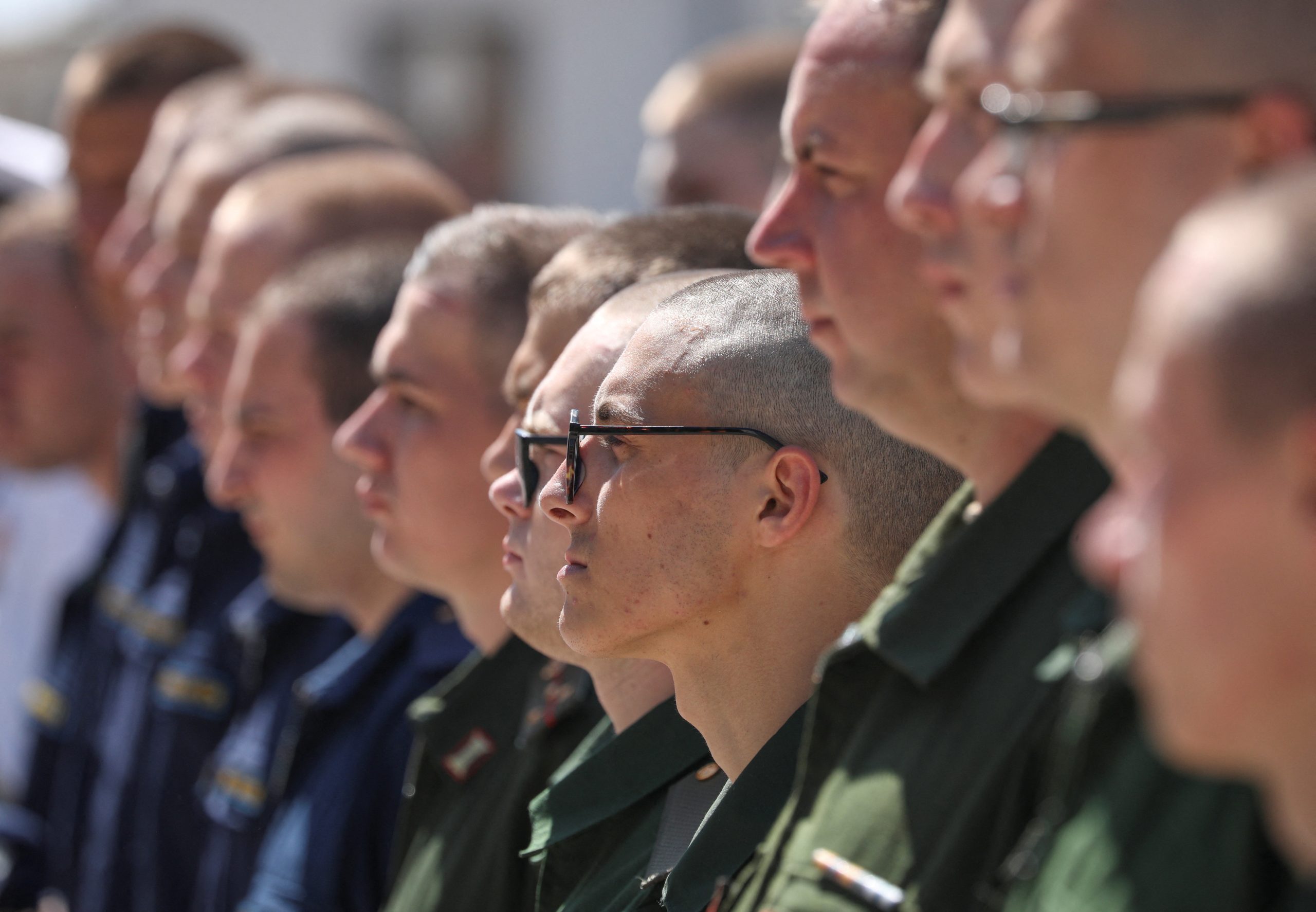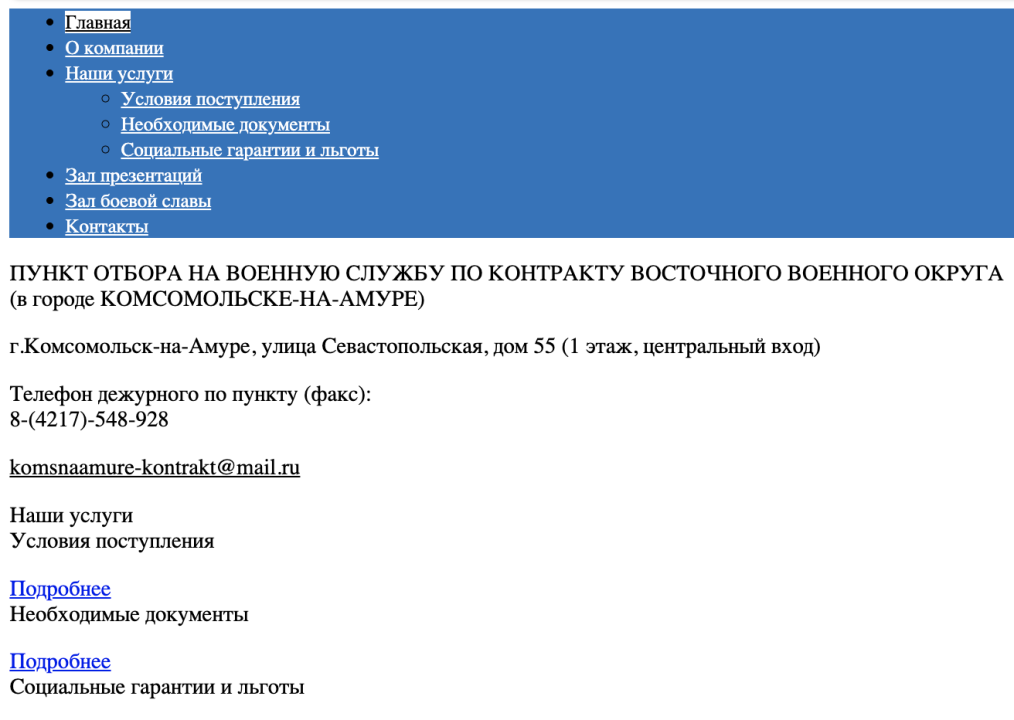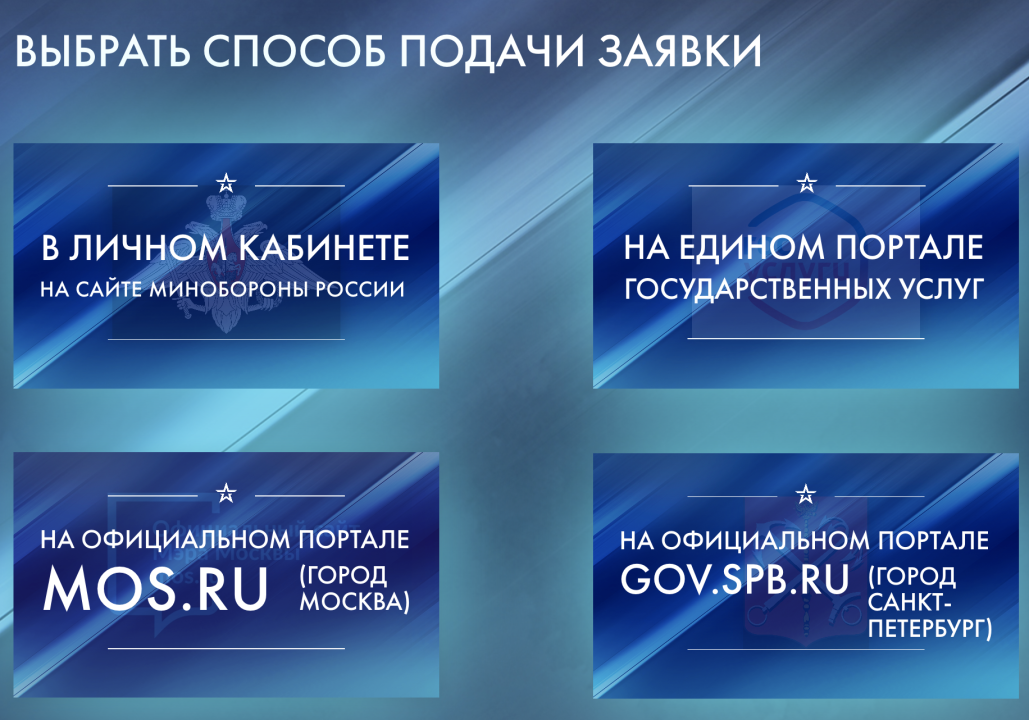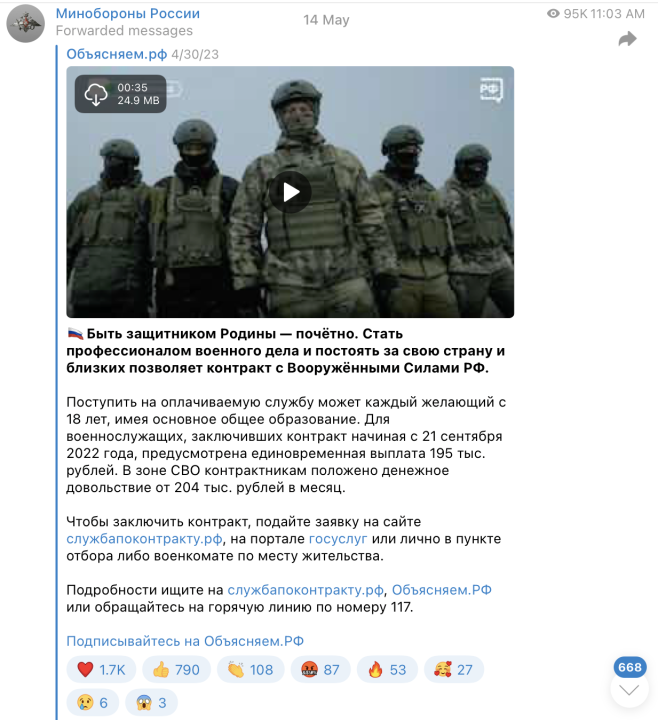Russia moves conscription and contract soldier recruitment online
Russian public services portal Gosuslugi becomes cornerstone for military recruitment, including delivering online conscription notifications
Russia moves conscription and contract soldier recruitment online
Share this story

BANNER: Russian conscripts called up for military service lineup before their departure for garrisons as they gather at a recruitment center in Sevastopol, Crimea on July 6, 2023. (Source: Reuters/Alexey Pavlishak)
The Russian parliament’s April 2023 adoption of an electronic conscription law expanded the ability of the Russian Ministry of Defense (MoD) to conscript soldiers online via the public services platform Gosuslugi. Concurrently, the MoD has become increasingly reliant on recruiting volunteer fighters using enlistment websites.
According to the new law, adopted by parliament on April 11 and signed by President Vladimir Putin on April 14, the government now considers a person as being legally summoned for military service upon receiving an electronic conscription notice through their Gosuslugi account, which Russians use to access public services. The electronic notice also automatically triggers travel restrictions, preventing the recipient from leaving the country. If a person fails to appear for service, Russian authorities can suspend their driver’s license and ban them from selling private property. In addition, the law envisages the creation of a new electronic registry documenting all Russians required to serve in the armed forces. According to Radio Free Europe/Radio Liberty, “The registry will collect extensive personal data, such as name, address and passport details, as well as medical, education, tax, criminal, voting, and employment records from numerous government organizations, including the police and communal services agency.”
The DFRLab previously reported on recruitment ads targeting communities in Russia using state information portals.
Russia’s digital expansion
The Unified Portal of State and Municipal Services, known in Russian as Gosuslugi, serves as Russia’s online public services portal. Founded in 2009 by the Russian Ministry of Communications, the portal and its mandate have gradually expanded over the years. The platform is overseen by Rostelecom, the Ministry of Digital Development’s largest contractor for developing government systems, through its subsidiary, RT Labs, which manages Gosuslugi operations.
As of 2022, over seventy million Russian citizens have registered with the public services platform, which they use to register businesses, cars, real estate, university applications, and even doctor appointments, among other uses. According to data from the Google Play Store, the Gosuslugi app has been downloaded more than fifty million times, nearly five times the number of downloads for the popular Russian app Yandex Mail.
Gosuslugi has become an unavoidable tool for Russians as public services increasingly go digital. The tool is available across all Russian smartphone marketplaces, including Google’s Play Store and Apple’s App Store. It also maintains a social media presence on platforms like Vkontakte and Telegram, both founded by Russian businessperson Pavel Durov.
The independent Russian news outlet The Bell reported that Russia’s upcoming electronic citizen registry “will receive a significant part of information about the life of potential recruits” from Gosuslugi. However, The Bell noted that questions remain about how the registry organizers will receive up-to-date information, such as someone’s place of residence if they move, as Gosuslugi may not have access to this information. Meduza, citing unnamed sources, reported that the “development of the registry turned into a ‘headache’” for the Ministry of Digital Development due to Russia’s Federal Security Service controlling the process and implementing tight deadlines. Russian Minister for Digital Development Maxut Shadayev stated that the registry will launch “no earlier than the start of the next autumn [2023] conscription for military service.”
According to an April 2023 article by Carnegie Senior Fellow Tatiana Stanovaya, the Kremlin is developing a “digital gulag” that serves as “a digital system of social control by regulating individual access to rights and benefits,” adding, “Being outside of this system will effectively spell social death.” Due to the infringement of rights brought on by the new bill, which impacts a person’s ability to leave the country, possess a driving license or real estate, access loans, and more, Stanovaya concluded, “[I]t’s no longer just about regulating the draft or further mobilization. The state is seeking to overhaul the traditional system of government coercion, to automate control of individual behavior without involving those individuals, their lawyers, or the courts.”
Vulnerable to misuse
On April 25, RBC and the government-affiliated Telegram channel Baza reported that a resident of Russia’s Sakhalin Island was signed up as a volunteer for the war in Ukraine after his Gosuslugi account was hacked. According to Baza, the Sakhalin resident received an unknown call from someone who introduced themselves as an employee of Gosuslugi and told the victim he had been hacked. The victim was reportedly asked to confirm a code he had just received on his phone via SMS; this likely served as a verification code that the caller could use to gain access to the account. Baza reported that three days later, the Sakhalin resident found himself signed up as a volunteer for Russia’s war in Ukraine when checking his Gosuslugi account. According to the post, the person was disabled, and “even if he wanted to, he could not have joined the special operation.”
On May 4, Bellingcat investigative journalist Christo Grozev reported on a new service offered by Russian brokers on the dark web: “unlisting a person from military registries” to help the person avoid mobilization. Depending on the region, the service could reportedly cost as much as 500,000 rubles ($6,150 USD). The brokers claim that beneficiaries will not receive official summons notifications on the Gosuslugi website.
Digitizing recruitment
The DFRLab analyzed subdomains affiliated with Gosuslugi and found that Russia’s digitization campaign also recruited contract soldiers. On the subdomain contract.gosuslugi.ru, which enables users to sign contracts with the Russian army, evidence of this activity can been found preserved on the Internet Archive’s Wayback Machine. The oldest archive of the subdomain was captured on April 18, 2023, four days after President Putin signed the law. A similar archived contract recruitment platform for the city of Moscow (contract.mos.ru), dates back to April 4. An additional recruitment subdomain, army.gosuslugi.ru, had no content at the time of writing.
The DFRLab also observed that the subdomain contract.mil.ru, belonging to the Russian Defense Ministry, redirected to a website with the Cyrllic URL службапоконтракту.рф (sluzhbapokontraktu.rf), which translates to “contract service.” Notably, archived snapshots of the website preserved by the Internet Archive’s Wayback Machine indicate that it had previously served as a contract soldier recruitment platform for the Eastern Military District in Russia’s far east; an archived copy dating to October 2016 includes contact information for a recruitment office in the far eastern city of Komsomolsk-on-Amur, Khabarovsk Krai. As recently as April 2, 2023, the website focused on recruitment in Sakhalin Oblast, also Russia’s Eastern Military District, listing a recruitment office in the city of Yuzhno-Sakhalinsk. By May 2023, the website had been repurposed to serve as the flagship platform for contract recruitment of all Russian nationals.



Clicking the “submit application” button (“ПОДАТЬ ЗАЯВКУ”) on the current iteration of the website prompts a pop-up that displays four online options for enlistment: the defense ministry’s recruitment website, the Gosuslugi contract soldier recruitment platform, and recruitment pages for Moscow and Saint Petersburg.

Additionally, the website is heavily promoted on the Russian defense ministry’s homepage, sometimes with more than one advertising banner.

As previously reported in the DFRLab’s Russian War Report, it appears that the Russian federal government may have tasked regions with creating websites advertising recruitment to push civilian populations to enroll as contract soldiers. These advertisements have been observed in Russian republics home to ethnic minorities, such as Udmurtia and Bashkortostan. As a result of службапоконтракту.рф being repurposed as a nationwide recruitment platform, a new domain, similarly entitled “contract service” (контрактнаяслужба.рф, or kontraktnayasluzhba.rf), emerged as the new local platform for the recruitment of contract soldiers in the Sakhalin Oblast.
The Russian MoD also registered an additional recruitment website, titled “Enroll as a contract soldier!” (служипоконтракту.рф, or sluzhipokontraktu.rf), in April 2023. At the time of writing, attempts to access the domain led to a blank page with a pop-up login request, followed by a 403 unauthorized request page bearing the message, “Ministry of Defense of the Russian Federation: Access is denied. We apologize for the inconvenience.“
Russian MoD recruits contract soldiers via Gosuslugi
The first mention of Gosuslugi on the Russian MoD’s Telegram channel dates to April 26, in an ad campaign for the launch of the website службапоконтракту.рф. In the Telegram post, the MoD invited Russian nationals to enroll, writing, “Submit your application with your personal account page on the website of the Russian defense ministry or on the unified portal Gosuslugi.” By June 4, 2023, at least thirty-nine MoD Telegram posts had mentioned Gosuslugi and службапоконтракту.рф.
Meanwhile, службапоконтракту.рф also contains a banner advertising for another website, Объясняем.РФ (Ob’yasnayaem.rf, or “we explain”). Created in March 2022, Объясняем.РФ contains information on enrollment in the Russian army and social benefits for people of the occupied Ukrainian oblasts who wish to obtain Russian citizenship.

On May 14, the Russian MoD Telegram channel reposted an Объясняем.РФ Telegram post advertising the recruitment of contract soldiers on new platforms. The advertised post contains a promotional video, which opens with footage depicting Russia’s victory over Nazism in World War II and includes a link to the службапоконтракту.рф website and the contract soldiers’ recruitment page hosted on Gosuslugi. The post was amplified by Russian propagandist Vladimir Soloviev on Telegram; according to estimates provided by TGStat, it reached a total audience of nearly 370,000 users.

In a previous analysis of targeted ads for contract soldiers using Объясняем.РФ’s regional channels on Telegram, the DFRLab uncovered how the initiative focused on promoting the recruitment of contract soldiers in various Russian regions. From April 17 to 19, Объясняем.РФ’s Telegram channel and twenty-two of its sister channels, corresponding to various Russian regions, reposted exact duplicates of the ad campaign promoting the launch of the службапоконтракту.рф website. The postings include a link to the Moscow-based recruitment portal, despite the channels being focused on various other Russian regions. It appears this campaign was tailored less to specific Russian regions and more to the general population.

Russia’s latest measures are part of a broader trend of digitizing recruitment efforts for the armed forces. Granting Gosuslugi access to Russian nationals’ personal information permits Russia to enact tighter control over its population. Russia’s continued efforts to further advance domestic online surveillance alongside the digitization of military recruitment efforts culminate in a system of enhanced repression.
Cite this case study:
Valentin Châtelet and Eto Buziashvili, “Russia moves conscription and contract soldier recruitment online,” Digital Forensic Research Lab (DFRLab), July 20, 2023, https://dfrlab.org/2023/07/20/russia-moves-conscription-and-contract-soldier-recruitment-online.

